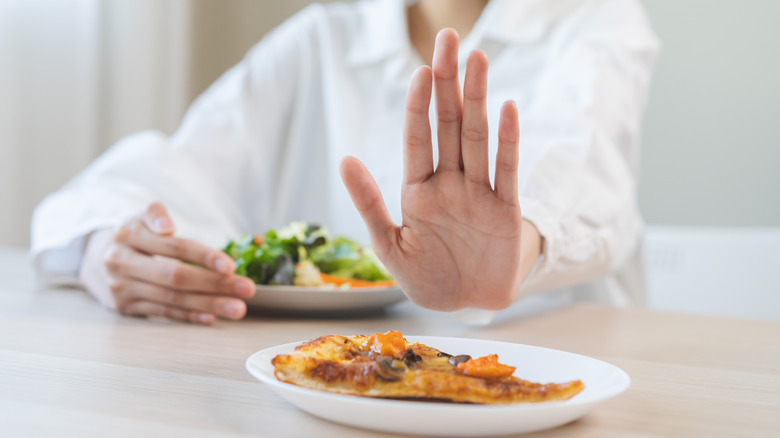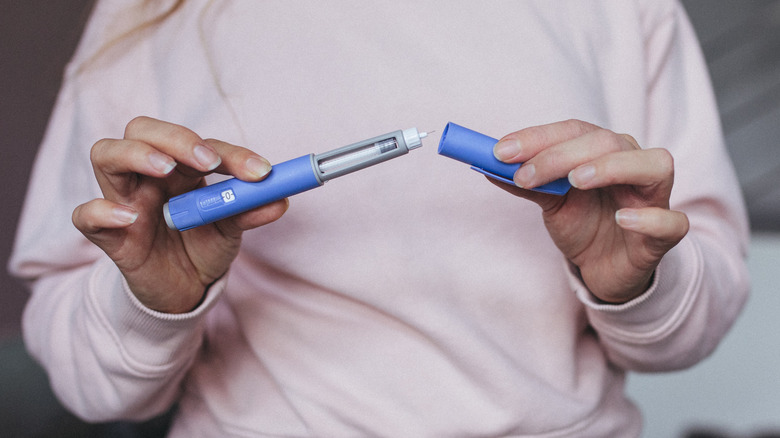You Might Start To Hate Meat And Fried Foods If You Take This Medication
Whether it's a basic pain reliever or an antidepressant, most medications come with potential side effects. Some side effects are mild, like dry mouth, drowsiness, or nausea, while others may be more problematic, like a heart attack or liver damage. When the Food and Drug Administration (FDA) approves a drug for use in the United States, it does so only when the benefits outweigh the risks. These side effects are typically listed on pharmacy labels and prescription bottles.
Many side effects are identified during clinical trials, but others may not appear until the medication is more widely used. For example, during early testing of the GLP-1 agonist Ozempic, the most commonly reported side effects were gastrointestinal issues like nausea, diarrhea, and constipation. However, a 2025 study in Food Quality and Preference uncovered another effect that may help explain how the drug works. People taking GLP-1 drugs such as Ozempic, Wegovy, and Zepbound ate about 50% less processed food, refined grains, soda, and beef, even though they still desired these foods.
Because these foods tend to be high in calories, participants also consumed around 700 fewer calories per day. The researchers suggest that GLP-1 medications might change how much pleasure people get from eating them, which could help explain why they ate less of these foods.
Weight loss drugs may change how you enjoy food
Ozempic (semaglutide) was originally developed to help people with type 2 diabetes by lowering blood sugar. Ozempic and other GLP-1 agonists work by mimicking a natural hormone called GLP-1, which triggers insulin release after meals. Researchers soon noticed a surprising side effect: weight loss. That's because GLP-1 also helps you feel full, which can lead to eating less.
GLP-1 agonist drugs may do more than curb appetite. They might also change how you experience food, according to a 2025 study published in Diabetes and Vascular Disease Research. The study surveyed 23 people taking oral semaglutide about their diets and food cravings before starting the medication and again three months later. The results showed reduced cravings for sweet and starchy foods, and participants reported it was easier to resist these cravings (here are some ways you can manage your food cravings).
Another GLP-1 drug, liraglutide, showed similar effects in a 2019 study in Diabetes and Metabolic Syndrome: Clinical Research and Reviews. After three months on liraglutide, the 18 participants became more sensitive to sweet flavors and had fewer cravings for sugary foods. They also reported that fatty foods became less enjoyable to eat.
What happens when you stop taking weight-loss drugs
Celebrities such as Meghan Trainor have admitted to taking Ozempic or similar medications to temporarily shed post-baby weight, while others like Oprah Winfrey have turned to these medications to help manage a lifelong struggle with weight. Although many people have seen significant weight loss with GLP-1 drugs, some choose to stop due to side effects, especially gastrointestinal issues.
But going off these medications can come at a cost. Once you stop taking Ozempic, appetite and cravings often return. TikTok content creator Claudia Oshry shared her experience with Ozempic, saying she struggled to feel full after stopping. In one TikTok post, she said she was still hungry after eating a 12-ounce steak and reached for a bag of popcorn. Similarly, body-positive model Remi Bader took Ozempic in 2020 to manage her weight, insulin resistance, and blood sugar. While Ozempic helped control her binge eating, she said those behaviors worsened after stopping the medication.
Unlike short-term diets that may help with temporary weight loss, GLP-1 agonists are not intended for short-term use. According to The Conversation, obesity is a chronic condition like high blood pressure that often requires ongoing treatment. For people prescribed GLP-1 agonists, staying on the medication is necessary to manage the health risks linked to obesity and type 2 diabetes. Your blood sugar may be affected because your body has become used to the medication working on your pancreas. As your cravings resume, you may also find the weight creeping back up again, which may also result in rising cholesterol and blood pressure levels.


